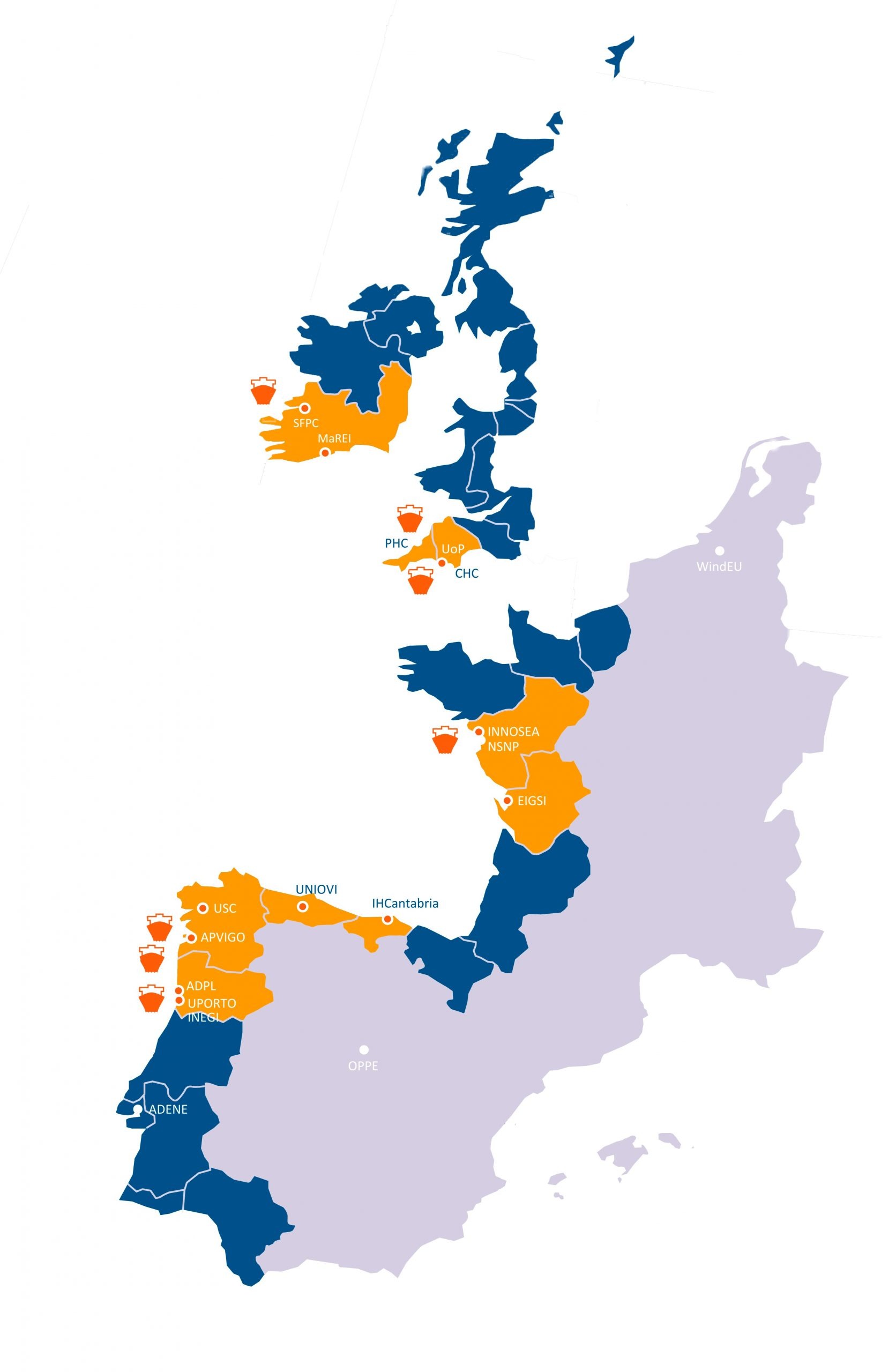
Funding: Interreg Atlantic Area
EIGSI Project Manager: André Martinez
Duration: April 2019 – September 2022
 Partners: Universidade do Porto – UPORTO (PT), Universidad de Santiago de Compostela – USC (ES), EIGSI (FR), Universidad de Oviedo – UNIOVI (ES), University of Plymouth – UoP (UK), Instituto de Ciência e Inovação em Engenharia Mecânica e Engenharia Industrial – INEGI (PT), Fundación Instituto de Hidráulica Ambiental de Cantabria – IHCantabria (ES), Administração dos Portos do Douro, Leixões e Viana do Castelo, SA – ADPL (PT), Autoridad Portuaria de Vigo – APVIGO (ES), INNOSEA (FR), University College Cork, National University of Ireland, Cork – MaREI (IE), Shannon Foynes Port Company – SFPC (IE)
Partners: Universidade do Porto – UPORTO (PT), Universidad de Santiago de Compostela – USC (ES), EIGSI (FR), Universidad de Oviedo – UNIOVI (ES), University of Plymouth – UoP (UK), Instituto de Ciência e Inovação em Engenharia Mecânica e Engenharia Industrial – INEGI (PT), Fundación Instituto de Hidráulica Ambiental de Cantabria – IHCantabria (ES), Administração dos Portos do Douro, Leixões e Viana do Castelo, SA – ADPL (PT), Autoridad Portuaria de Vigo – APVIGO (ES), INNOSEA (FR), University College Cork, National University of Ireland, Cork – MaREI (IE), Shannon Foynes Port Company – SFPC (IE)
Website: https://portosproject.eu/
The PORTOS project is based on the observation that ports harbour a wealth of natural resources. Not only that, but they also represent a significant source of pollution (especially air). Ports consume considerable amounts of energy, when there are renewable resources on-site that have not yet been tapped into.

Objectives of the PORTOS project
The main objective of PORTOS is to develop and promote the implementation of renewable energy (RE) sources in Atlantic Area ports. The project is therefore focusing particularly on marine renewable energy (MRE) the likes of wave, tidal, solar and wind energy.
The aim is to transition towards energy self-sufficiency in ports and to meet two environmental priorities:
- Reduction in greenhouse gas emissions,
- Reduction in air pollution.
Moreover, PORTOS sets out to increase ports’ energy self-sufficiency by defining a road map aimed at reducing their impact on climate change. PORTOS is also boosting the competitiveness of the Atlantic Area region on the MRE market, through the development, implementation and transfer of decision support tools. Three representative ports of the Atlantic Area are being used as case studies along with two others to test the project’s findings.
The project’s other objectives are to:
- Analyse the energy efficiency of the target ports.
- Assess the potential for implementing RE sources in the target ports.
- Develop, optimise and adapt the MRE technologies for supplying the Atlantic Area ports.
- Design tools for selecting the most appropriate RE sources in the ports.
- Establish guidelines for energy self-sufficiency thanks to the RE sources in the ports.
- Transfer the knowledge acquired to industry and the authorities.
- Share the benefits of MRE use in port areas as well as the project’s findings.
- Train the younger generations in MRE, support the development of new technologies and promote entrepreneurship.

Advocate for MRE use at European level.
Pursuant to the EU’s energy and transport strategies, PORTOS is capitalising on the technical and political progress made in recent years to set the stage for the MRE sector’s development. What is more, it is helping to develop specific planning solutions and technical solutions. It is also paving the way to the definition of governance frameworks for energy efficiency and RE use in the Atlantic Area ports.

EIGSI’s contribution
Drawing on its previously acquired expertise, the school is involved in several of this project’s work packages:
- Assessing the ports’ energy potential and setting up a method for assessing this potential across all of the ports along the Atlantic Coast. The school will draw on the experience it has gained in the Energymare and Turnkey projects for example. The objective is to publish these methods and to make them widely accessible to local authority policymakers in the areas concerned. Setting up sophisticated modelling tools is one of the measures that EIGSI will be implementing to successfully deliver this work package.
- Study of all of the storage technologies required for these new systems to work effectively. Renewable energy sources are often intermittent. They are associated with the wind, sunshine or the tides. Storage solutions need to be studied and sized to meet the ports’ specific requirements. This is where EIGSI comes in, drawing on the experience it has gained in the Mat4Bat or MOBICUS projects and relying on its L3E laboratory to address this project.
- Over and above the storage issue, integration of these renewable energy solutions requires a connection to the optimum grid. With that in mind, EIGSI will be making available its LERPA laboratory to simulate the green sourcing of electricity and its injection into the grid. The experimental Smart Grid available at the school will be used to identify and develop the most effective algorithms in terms of energy yield. In these studies, close attention will be paid to maintaining the balance of the grid.